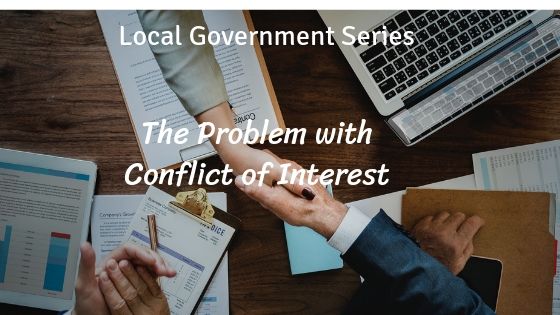Lack of transparency into conflict of interest considerations are hampering Western Australian councils’ procurement controls, according to a recent audit of eight local councils.
Across in Victoria, a March report by the corruption watchdog came up with a similar theme.
The fact is, conflicts of interest (COI) are inevitable in procurement. They are not always possible to avoid. While conflicts of interest are not necessarily unethical or wrong, they can become a risk if they are not properly identified and declared, and transparently managed – especially in Local Government procurement where the public interest needs to be protected.
After all, a conflict of interest can affect an employee’s judgement as to what is in the public interest, or lead to a bias in their decision making for a tender.
Yet, many Local Governments are not effectively identifying, managing and documenting these risks.
In New South Wales, an audit found that agencies did not always transparently manage conflict of issues.
In WA, a corruption watchdog warned public servants about the need to make an early declaration of potential conflicts of interest after an employee became romantically involved with a consultancy owner.
“Had there been an early disclosure, the problem may not have escalated”, the report stated.
So, what should local government do?
1) Take a systematic approach
Procurement needs to take a systematic approach to mitigate perceived, potential and actual COI risk.
The steps will inevitably vary depending on the circumstances. But if there is a process to follow, it comes down to the employee to ensure they take sufficient steps to avoid risks to the public interest.
2) Document decisions
Documenting the decisions is important because it ensures transparency and accountability.
Even if a COI doesn’t automatically exclude someone from taking part in the tender evaluation process, there should still be a clear record.
The record should clearly show:
-
A declaration of interest has been made and signed
-
Someone with appropriate authority has reviewed the declaration
-
This situation has been assessed to see if it results in an actual, potential or perceived conflict of interest
-
The decision made on how to remove or manage the conflict
For this process to be effective, everyone involved needs to be clear on what a conflict of interest is and what their responsibilities are.
3) Make information public
The Auditor General of WA recommended that Local Governments should maintain a Tenders Register and make it available to the public. This increases confidence in tender processes.
Remember, conflict of interest declarations may contain personal, sensitive and confidential information, so any associated documentation will need to be carefully managed if you’re making it public.
4) Make the process continuous
Disclosing actual or potential conflicts should be a continuous process. Why? Because the situations can change over time. Apparent COIs now can become actual COIs later on.
Over to you
Want to learn more about COIs and how to manage them in Local Government? Find resources on good record management for councils on the Victoria IBAC website and in the WA Auditor General’s guide.
Read more about how to prepare for Australian bribery and anti-corruption reforms in our article here.






